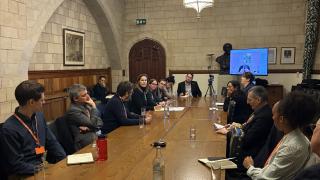
The Ministry of Defence recently responded to a letter sent by UNA-UK and its partners in the UK Campaign to Stop Killer Robots, in advance of planned UN talks on Lethal Autonomous Weapons Systems (LAWS).
In response to the joint letter to the Secretary of State urging the UK to support a legally binding treaty to prohibit lethal autonomous weapons, the UK Government wrote:
It is our view that we should embrace and welcome technological advancements that can support compliance with International Humanitarian Law, as in doing so we can offer greater protection to persons who are not, or who are no longer, participating in hostilities. A legally binding instrument which hampers the legitimate development and use of such technologies would be counterproductive."
UNA-UK is concerned by the UK's position which appears to cast a ban on LAWS as “counterproductive” and incompatible with humanitarian principles. Banning lethal autonomous weapons need not prevent technological advancements that can help protect civilians, and, considering the widespread humanitarian concerns about the creation of LAWS, we seek clarification on this argument and the publication of any research the UK has conducted which models possible effects of a new treaty on the development of technology relating to civilian protection.
Broadly, we welcome the UK Government's assurance that its weapons systems “will always be under human control” and the affirmation that the UK will be “encouraging all High Contracting Parties to the CCW to be present at, and participate in discussions.” However the UK needs to plan for the possible failure of UN talks under the auspices of the CCW (currently scheduled for November 2021) to reach consensus on substantive and timely action to address the risks posed by killer robots.
While the UK Government has argued that the UN CCW “remains the right forum in which to progress work on LAWS,” we note that both the Mine Ban Convention and Convention on Cluster Munitions were ultimately negotiated outside of the CCW. Though the UK did not agree with the decision to move discussions on these issues outside the UN system initially, it later joined these processes and signed on to the subsequent treaties.
UNA-UK, along with UK members of the Campaign to Stop Killer Robots, believe that the UK can reduce the risks posed by LAWS by building on its useful work exploring the practicalities of retaining meaningful human control over the life cycle of a weapon and by showing leadership through working with states to proactively achieve a legally binding prohibition on killer robots.
We will continue to work with stakeholders in the UK as well as states in support of a global ban to prohibit lethal autonomous weapon systems.
- Learn about the call for a ban on LAWS at the House of Commons
- Read the UK Campaign to Stop Killer Robots’ letter to the Secretary of State
- Read the Counter Proliferation and Arms Control Centre’s response
- Learn about the CCW
- Learn about the Campaign To Stop Killer Robots and follow them on Twitter @UK_Robots
- See the campaign’s analysis of UK contributions up to 2020
- Read the Together First campaign’s call for a ban on killer robots
Photo: Members of the Campaign to Stop Killer Robots meet in 2013. Credit: Campaign to Stop Killer Robots






